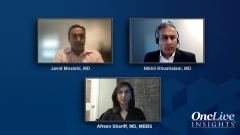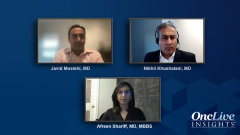
Navigating Challenges in Predicting and Mitigating Adverse Events in Adjuvant Immunotherapy
Nikhil Khushalani, MD, navigates the challenges associated with predicting and mitigating adverse events in adjuvant immunotherapy, offering valuable insights into strategies for addressing potential complications in this treatment approach.
Episodes in this series

This is a video synopsis/summary of an OncLive Insights® discussion involving Afreen Shariff, MD, MBBS; Javid Moslehi, MD; and Nikhil Khushalani, MD.
This segment discusses challenges in predicting and mitigating treatment-related adverse events with adjuvant immunotherapy for melanoma.
Dr Khushalani states that being able to identify patients at high toxicity risk with checkpoint inhibitors would be ideal. Factors that raise caution for toxicity include underlying autoimmune disorders like rheumatoid arthritis that could be exacerbated. He would also have thorough discussions about using adjuvant checkpoint blockade in transplant patients given the risks of severe or chronic toxicity and need for long-term replacement therapies.
He notes that because available adjuvant approaches improve relapse-free but not yet overall survival in melanoma, patients and doctors must weigh whether that potential benefit outweighs quality-of-life risks, considering relapse patterns if observed initially (eg, regional nodes versus distant sites). Ultimately, deciding on adjuvant therapy requires an in-depth shared decision-making process with patients.
Video synopsis is AI-generated and reviewed by OncLive® editorial staff.




































